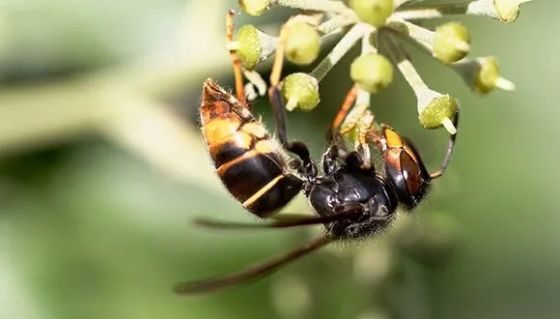
Buzzed but Never Tipsy: Hornets’ Remarkable Alcohol Tolerance
Oriental hornets are the only animals able to drink unlimited amounts of alcohol.
A new study from the School of Zoology and the Steinhardt Museum of Natural History at Tel Aviv University has revealed that the Oriental hornet is the only known animal capable of chronically consuming alcohol in high concentrations with almost no negative effects on its health or lifespan. The research team says, “This is a remarkable animal that shows no signs of intoxication or illness even after ingesting huge amounts of alcohol.”
The research was conducted under the leadership of postdoctoral fellow Dr. Sofia Bouchebti from Prof. Eran Levin’s laboratory at Tel Aviv University’s School of Zoology and the Steinhardt Museum of Natural History. The study was published in the journal Proceedings of the National Academy of Sciences of the United States of America (PNAS).
The researchers explain that alcohol is commonly produced in nature through the breakdown of sugars by yeasts and bacteria, primarily found in ripe fruits and nectar. Although alcohol contains nearly twice the amount of energy as sugar, it is toxic to most animals — including us humans — with occasional consumption, and especially with chronic use. Among the animals known to consume alcohol are fruit flies, which show signs of alcohol poisoning even at relatively low concentrations, and treeshrews — mammals native to East Asia that feed on ripe, alcohol-rich fruits — who show symptoms such as fatty liver and other effects indicative of alcoholism after consuming low concentrations of alcohol continuously for several days.
As for humans, many of us like consuming alcohol. Humans domesticated the wine grape around 10,000 years ago, and compared to other animals, we can tolerate and often enjoy consuming relatively high amounts of alcohol. However, as we know, alcohol has significant effects on behavior, cognition, and, of course, health, with a host of diseases linked to its consumption.

Hornets Can Handle Their Liquor
In the new study, the research team tested the Oriental hornet’s ability to consume alcohol and break it down. Dr. Bouchebti explains: “The hornets naturally store yeasts in their digestive system, which provides them with a unique environment that allows the yeast to develop and reproduce, creating new strains. One explanation is that hornets transfer yeasts to fruits, which indirectly contributes to the production of wine. In our study, we labeled the alcohol consumed by the hornets with a heavy carbon isotope. As the alcohol is metabolized, it breaks down into carbon dioxide, which is exhaled. By measuring the amount of labeled carbon dioxide emitted, we were able to estimate the speed at which the alcohol was broken down. The findings were surprising; we were amazed to see the rapid rate at which the hornets metabolized the alcohol”.
In the next stage, the researchers sought to determine whether the Oriental hornet ever becomes intoxicated. Does increased alcohol consumption affect their behavior, for example causing aggression or impacting their nest-building abilities? Here too, the findings were surprising: even when consuming high concentrations of alcohol (80 percent alcohol as the sole source of nutrition) there was no noticeable effect on the hornets’ behavior. In the final phase of the study, the researchers tested whether alcohol had any impact on the hornets’ lifespan and health. Once again, they were amazed to discover that no differences were found between the lifespan of hornets that consumed only alcohol for their entire lives (three months) and hornets that consumed sugar water.
No Hangovers Here
Prof. Levin concludes: “To the best of our knowledge, Oriental hornets are the only animal adapted to consuming alcohol as a metabolic fuel. They show no signs of intoxication or illness, even after chronically consuming huge amounts of alcohol, and they eliminate it from their bodies very quickly. In a bioinformatics analysis of the Oriental hornet’s genome, conducted by Prof. Dorothee Huchon, it was discovered that the hornet possesses several copies of the gene responsible for producing the enzyme that breaks down alcohol; this genetic adaptation may be related to their incredible ability to handle alcohol. We propose that the ancient relationship between hornets and yeast led to the development of this adaptation. Furthermore, while alcohol-related research is highly advanced, with 5.3 percent of deaths in the world linked to alcohol consumption, we believe that, following our research, Oriental hornets could potentially be used to develop new models for studying alcoholism and the metabolism of alcohol”.
